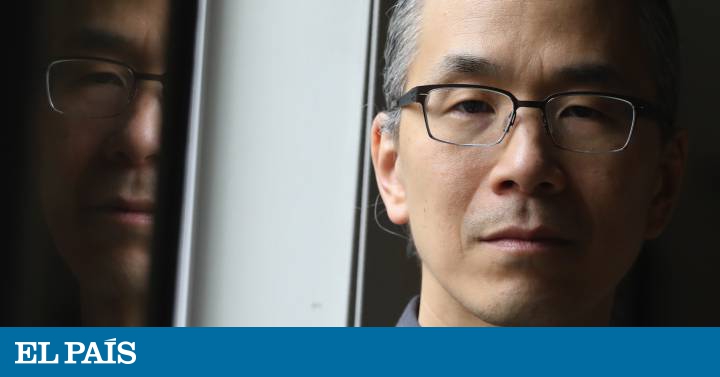He picks up the virtual phone in what looks like his office, there in distant and still not so cold Seattle.
There is a wall lined with books behind her.
He's wearing helmets, it's morning.
He says he started writing at age 11, after reading Isaac Asimov.
When asked if he considers himself more of a philosopher than a science fiction writer, he laughs.
Not out loud, because everything about Ted Chiang (New York, 53 years old) is contention.
He has written only 19 stories in 30 years, but with all of them he has hit some kind of target.
The world knows him for what Denis Villeneuve and Eric Heisserer did with one of them.
The book was entitled
The Story of Your Life
and it put the human being against the ropes of the narrative order, and of his own condition as a time machine.
That's what the
arrival was about
, the film starring Amy Adams, as an atypical heroine who tries to communicate with an alien race for which time does not exist.
Everything for them happens at the same time, because their language does not understand the past, the present and the future.
“I would not consider myself a philosopher, but it is true that I write about philosophical questions.
Science fiction is perfect for that.
It makes any premise of thought attractive and credible.
Today the world would read more philosophy if, instead of writing treatises, philosophers had written science fiction stories ”, he replies.
The author is not afraid of the label.
He has been at the top of the fantasy genre since the publication of his first book of short stories, in 2002, and he feels comfortable in that highly literary condition that makes it indistinguishable from any other type of genre, which makes it, in reality, a genre. in himself, and in him, in the most advanced student of Isaac Asimov.
He does not think there is anything wrong with the term.
“Science fiction is a powerful genre, it paves the way for us.
Explore the inevitability of change, ”he says.
His speeches are long.
He stops to think often, there is silence then, a silence that tends to break with a "you" - pronounced exactly as it is read -, a catchphrase that is like a small base from which to start in another direction, or continue immersing himself in it.
He has just published
Exhalación
(Sixth Floor / Mai Més in Catalan), his second collection of stories.
Three of the nine stories included in it won the Hugo Prize at the time.
In total, and with only the aforementioned 19 published stories, Chiang has been distinguished, among others, with four Hugo, four Nebula, six Locus and the British Science Fiction Association Award.
This is the first time something like this has happened.
That someone with so little work has won so many awards and supposed such a revolution.
Why do you write so little?
Oh, I wish I could write more.
I wish I could write more quickly, but I can't.
It takes months, sometimes years, to develop an idea.
Ideas come to me all the time, but I only stick with the ones that torment me.
The ones that come back again and again.
So I try to find a way to turn them into a story ”, he replies.
It is a highly artisan process.
He spends so much time with these ideas that it explains, he says, why he always writes about what he considers "the good side of human nature."
“I mean, I have good and bad days, like everyone else.
American politics is, for example, disheartening to me, and it makes me think of the worst in human beings.
But I don't want to spend months or years, which is how long it takes to write my stories, as I have said, thinking about the worst of the human being.
I want to think of the best, because people can be wonderful.
In a sense I fight my own condition, because I tend to be cynical and pessimistic.
I guess fiction is a kind of armor that doesn't let me fall, ”he says.
Of Chinese descent, Chiang studied computer science and is dedicated to writing
software
manuals
.
There is an account in
Exhalation
, 'The Life Cycle of
Software
Elements
', which imagines us raising virtual beings as real and self-aware as Philip K. Dick's androids.
“I like Philip K. Dick, but I haven't read all of his books.
In that story, I wonder how a person is made, and at the same time I deconstruct the idea of the robot.
I have always wondered why science fiction has believed that the robot or the android is, to begin with, perfect.
All the stories tell us that you order it from the factory, it arrives at your house, you turn it on and it is already the perfect butler.
It obeys you, it is loyal.
It does nothing wrong.
And on top of that he has self-awareness.
Have we really believed that we can program a person without further ado? ”, He exposes.
Memory is, along with the absurd and egotistical need of human beings to seek other civilizations outside of this planet - "when there are so many on this planet to communicate with," he says, referring to animals -, one of the central themes of the book, and his work.
"What writer is not interested in memory?
We are what we choose to remember, ”he says.
The story 'The truth of the fact, the truth of the feeling', was born from one of those ideas that returned to his head all the time.
“I read an article about a woman who had no episodic memory.
I mean, she remembered things, but not in the form of scenes.
For example, she knew she was married and had been to Hawaii on her honeymoon, but she didn't remember anything about that honeymoon.
She knows she was a girl, but she doesn't have a single memory of her childhood.
I couldn't get it out of my head.
And I thought about writing about the opposite, about being able to remember everything exactly.
Who would we be then?
Would we be someone? ”, He says.
On the current pandemic - "oh, I'm lucky, I don't have to leave the house, so I'm not exposed, and I don't have children to worry about either," he says - he assures that there was no way to prevent our behavior. More than science fiction, I had been rehearsing a similar situation for years.
And why is that?
“Because all fiction tends towards drama, and whenever there has been a plague in one of them, everything goes very fast: everyone is infected and everyone dies.
The real one is a more moderate, less dramatic setting.
In fiction, society instantly collapses, and that is not because we think it would be so, but because the writers are warning of the fragility of our system, of the fragility of the sense of civilization.
It is a fear, it is not a reality.
The pandemic has taught us that people are not as bad as disaster movies believe, for example.
We have helped each other, we are helping each other, and we are beginning to be aware of what really matters, even in the workplace.
The jobs that matter are those that bring food home and make things and heal us, ”he replies.
In any case, he considers, he repeats, that if there is “something that science fiction intends to teach us about, it is that we must be open to change”.
Not surprisingly, it was born to try to explain the future to the creatures of the past that we were when the Industrial Revolution broke out.
"Until then everything had been predictable, from then on, everything was a mystery," he says.
And what do you think of the rise of Chinese science fiction?
Why do you think the West is so interested in these days?
“On the one hand, I think it's just a matter of the success
of Cixin Liu's
The Three Bodies
Trilogy.
Economically and trendingly, I guess it's the new
Scandinavian
noir
.
As simple as that.
On the other hand, I think there is something interesting in the new Chinese science fiction that may also have something to do with that little wave, and that is that it is very similar to the science fiction of the North American golden age, that triumphalist science fiction who dreamed of the stars and traveled to the stars.
I suppose it is a relief to see that someone continues to dream when in the West the future is seen as
Interstellar
proposes it
, as a great desert without hope.
What I am not so clear about is that this triumphalism ends up being something more than an empty gesture, which is what it will be as long as there is no great Chinese film blockbuster that reaches the whole world.
And I'm talking about cinema.
Chinese science fiction cinema that is popular around the world ”, he considers.
Speaking of cinema, is any other of your stories going to make the leap to the small or the big screen soon?
"There is something going on, but I haven't signed anything yet, so I don't know," he answers.
It's still the morning in Seattle, it's a day in early September, are you thinking about any ideas right now?
"I always do, but sometimes, the idea disappears, so better not to talk about it."












/cloudfront-eu-central-1.images.arcpublishing.com/prisa/S7ERVSCT4FUVX6R7TUVBDNTH5Y.jpg)


